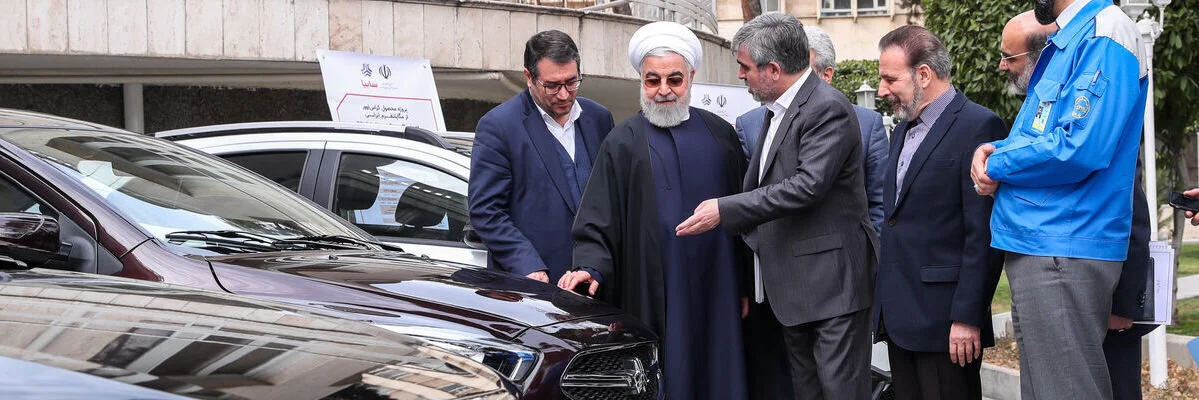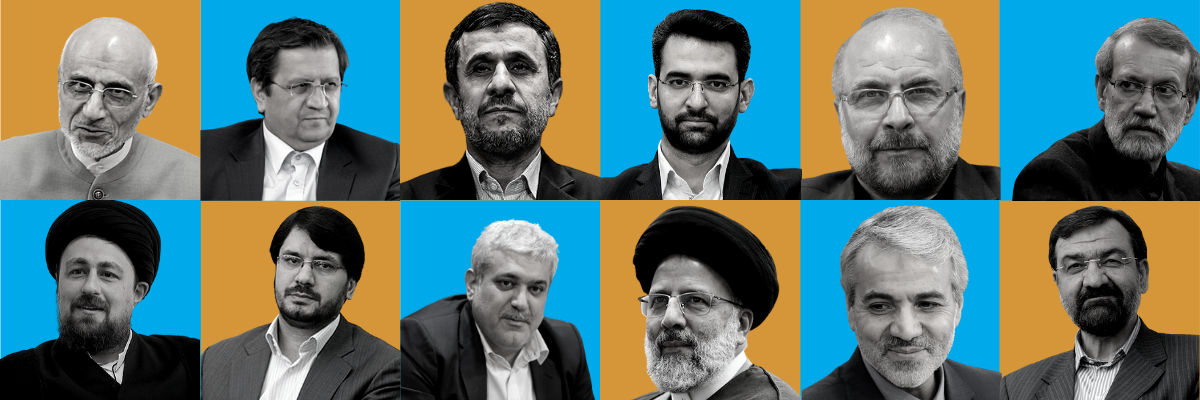Iran's Rouhani Ousts Industry Minister Seen as Disloyal and Doomed
When Iran’s industry minister, Reza Rahmani, sat down for a meeting with Iranian Vice President Eshaq Jahangiri on Monday, he did not know that he was about to be fired.
Rahmani was accompanied to the meeting by his deputy Hossein Modarres Khiabani, who would soon be named as his interim replacement.
After the axe came down, Rahmani wrote an open letter to President Hassan Rouhani in which he claims his dismissal was part of “a political plot.”
“Despite enemies’ plots, and in line with the Supreme Leader’s wishes, I have been able to boost production while sustaining the supply of essential goods. I am proud [of my record]. I am surprised that I am being ousted for political reasons alone,” Rahmani writes.
In the letter, Rahmani also claims Rouhani’s that chief of staff, Mahmoud Vaezi, strong-armed him to get a government-sponsored bill passed. The bill, which was shot down by parliament on Sunday, would have paved the way for the re-establishment of the Ministry of Trade which was dissolved and merged with Ministry of Industry and Mine in 2011.
Rahmani writes, “Mr. Vaezi threatened that if the bill does not pass, I would be sacked. He also told me that I must lobby MPs and whip the vote. I responded that the parliament is not controlled by me, but I don’t oppose the bill.” Rahmani, a three-term parliamentary representative, was believed to hold sway over many of his former colleagues, especially MPs of Azeri heritage.
In response to the letter, Vaezi’s office released a blistering statement accusing Rahmani of twisting facts to put his conduct in a better light. In a deliberate turn of phrase, the statement condemns Rahmani’s letter as tailored “to mislead the people and disturb public opinion,” an act that is a crime under Iran’s Islamic Penal Code. While the Rouhani administration is unlikely to press charges against a former minister, the statement was clearly intended to intimidate.
In response to Rahmani’s accusations, the statement claimed that the former minister “was not requested to support the government-sponsored bill but to put an end to his three confidants lobbying efforts against the bill—the three individuals' names will be released if need be. [Rahmani] was warned by the president that his continued conduct was unacceptable and that such conduct would be dealt with decisively.”
The Wrong Man
Despite his sudden ouster, many in the business community had not expected Rahmani to last in the role of industry minister. Hamid Reza Salehi, secretary general of the Energy Commission of the Iran Chamber of Commerce explained that many pitfalls face Iran’s industry minister.
“Over the years, without an exception, every politician appointed as industry minister has faced the gargantuan task of regulating and facilitating the growth of varying and at times conflicting business sectors. With the US maximum pressure campaign squeezing Iran’s economy, the burden has become heavier,” he said.
In October 2018, during the lead-up to his confirmation hearings, Rahmani met with chambers of commerce and other industries bodies to garner the support of the business community. Salehi noted, “From the first day after Rahmani’s appointment, everyone knew he was the wrong man for the job.”
Like most Iranian business leaders engaged in foreign trade, Salehi is critical of the ministry’s overwhelming focusing on industrial development, at the expense of support for trade promotion. The challenges facing Iran’s economy go beyond government officials finding themselves out of their depths. “Iran’s economy is afflicted with fundamental challenges: heavy-handed government interventionism, state interference with the natural supply and demand equilibrium, rent-seeking practices, and inherent corruption,” Salehi observed.
He added, “Iranian authorities still believe they can sell oil and distribute the proceeds. They simply do not adhere to market-economy principles or believe any good would come out of them. Anyone put at the helm of that ministry would have to grapple with all these misconceptions and hurdles. Replacing the minister will just lead to another media circus, nothing more.”
Salehi believes that the 2011 merger of the ministries of industry and trade “could have been a good move” that would have helped reduce the size of government. “Many countries have taken similar steps over the years. But since the merger, different administrations have failed to find someone to properly lead the ministry.”
Salehi is skeptical that the government’s plan to establish a new trade ministry, which would essentially reserve the 2011 merger, is well-considered. “If you were to tell me that a new ministry is to be established that will focus on streamlining exports, I would support that. But if the government motion solely intends to reverse the merger, I oppose it. I don’t support decisions that are only intended to reverse change. Fundamental issues need to be addressed and that would not happen even with the establishment of a dozen new ministries.”
Mehdi Zahedi Avval, who is the CEO a trading company active in the export of food products, agrees with Salehi that Rahmani was not up to the role of industry minister.
“Rahmani did not have the mettle for the job. President Rouhani tapped him because he had extensive ties to the parliament and, in theory, could have whipped the vote for government-sponsored bills. We all now know how that ended for the president,” he said. Zahedi notes that Rahmani had been tapped for the role of minister by his predecessor Mohammad Shariatmadari, who was similarly pushed out of the role despite his former position as the head of SETAD, the holding company affiliated with the office of Iran’s Supreme Leader.
Zahedi supports the re-establishment of the trade ministry. “Merging the ministries was a mistake. A single government agency can’t be in charge of regulating industry and trade simultaneously. On many occasions, these two sectors have conflicting interests.” Having separate ministries which could voice their demands on behalf of their respective interest groups who “would help create a transparent equilibrium,” Zahedi said. “But now all decisions are made behind closed doors.”
The reestablishment of the Ministry of Trade has been debated on numerous occasions by members of the Tehran Chamber of Commerce, according to member Farhad Ehteshamzad, an Iranian industrialist and the former head of the Iran Auto Importers Association.
“After the two ministries of trade and industries were merged in 2011, no structural reform was implemented. The departments and offices of the two ministries are now operating under a single minister’s watch,” Ehteshamzad said.
Moretza Miri, a board member of Iran’s influential Carpet Manufacturers and Exporters Association, also pointed to the failures of the 2011 merger. “After the merger was implemented only 403 employees were laid off. All the assets of the dissolved ministry including all of the buildings, are now owned by the Ministry of Industry, Mine and Trade. How does that translate into cutting government down to size?”
The Trade Taboo
Rahmani and his allies deny the Rouhani administration’s narrative that he was lobbying against the bill to establish a trade ministry. However, many lend credence to the narrative coming out of the presidential palace.
“Rahmani knew that re-establishment of the commerce ministry would limit his powers. Coming face to face with that fact, he started lobbying MPs to kill the bill. A government minister standing against a government-sponsored bill; it is no surprise that Rouhani sacked him so quickly,” said Miri.
Uncharacteristically for Iranian bureaucratic correspondence, the letter in which Rouhani named Khiabani as the caretaker minister made no mention of Rahmani. Such letters are usually offer lavish praise for the outgoing official, even when they have been fired.
Miri is hopeful that Rahmani’s replacement will prioritize trade at a time when Iran needs to further diversity exports to make up for the collapse in oil revenues. “I have directly worked with Rahmani’s replacement. Khiabani is hardworking and has had a focus on non-oil exports. That will be a plus.”
But not everyone is so encouraged. Nasim Tavakol, who runs an e-commerce business specializing in imported electronics, is worried Khaiabani lacks the necessary experience. “Does Khiabani have any solid experience in trade and industry? He has been a board member of a few state-owned companies. And what these board members do? They attend meetings that revolve around sharing a cup of tea and having some snacks. In my book that’s zero experience in business and trade,” she said.
Speaking of the ousted minister, Tavakol said, “In his letter, Rahmani claims that he supported businesses. What he did was not ‘supporting businesses’. He helped rent-seekers line their pockets while his hasty decisions disrupted legitimate businesses.”
Tavakol believes that despite his poor performance Rahami avoided impeachment due to support from key allies in parliament, including reformist MP Masoud Pezeshkian. Reportedly, the same allies helped kill the trade ministry bill. Pezeshkian and his office were not available for comment.
Tavakol had expected the trade ministry bill to fail, “The decision-making processes are utterly politicized in Iran. And the parliament wouldn’t ratify a major motion put forward by Rouhani administration.”
The debate over the creation of a trade ministry has also been politicized due to fears that its creation would lead to increased reliance on imports and capital flight. Tavakol explained that imports have become “taboo” in Iran. “Most MPs would think twice before supporting such a bill.”
So far, just six MPs have reacted publicly to Rahmani’s ouster. Outspoken reformist MP Mahmoud Sadeghi tweeted obtusely, “One of the problems of Rouhani admin has been lack of coordination between different ministries; one lobbies in favor of a bill, another against it.”
Ahmad Amirabadi, a former IRGC officer and conservative MP representing Qom, voiced his support of Rahmani, writing on Twitter,“Dear people, you need to know that Mr. Rouhani did not sack Mr. Rahmani over your problems or car prices. Rahmani was warned that he must resign if the Majlis does not vote in favor of the trade ministry (read: ministry of imports and rent-seeking). He declined to resign and was sacked.”
Conservative MP Abdollah Razian has so far been the only politician to have actuallly defended Rahmani’s record. “Considering the current conditions, Rahmani’s conduct was proper,” he stated in an interview with the parliamentary news agency, ICANA.
Yet, while Abdollah Razian claimed that the industry minister did not take a stance against the bill to reestablish a separate trade ministry, he conceded that Rahmani “did not do anything to get it passed.”
Rahmani failed to whip, so he got the axe.
Photo: IRNA




